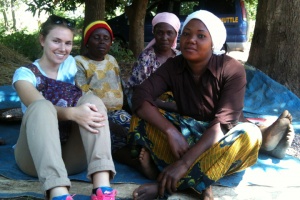A new goal for soccer: Improving attitudes toward refugees
While a national soccer win can stoke anti-refugee sentiment, messaging promoting diversity can reverse this effect.

A national soccer win can prompt nationalism accompanied by animosity toward outsiders. But with the right messaging, soccer wins can also be an opportunity to build positive feelings toward foreigners, specifically refugees.
Image: Jannik Skorna/Unsplash
Across the globe, 26 million people have been displaced from their home countries by civil war, drought, political persecution, and other crises. At the same, attitudes against refugees are hardening in many countries; a 2018 survey found that 40 percent of Kenyans have heard that refugees are a security threat, and 45 percent don’t think refugees should be allowed to freely move around the country.
In a new paper in the journal Comparative Political Studies, MIT Governance Lab (GOV/LAB) research affiliate Leah Rosenzweig PhD '18, who is a postdoc at Stanford University, and University of British Columbia assistant professor of political science Yang-Yang Zhou show that a national soccer win can prompt nationalism accompanied by animosity toward outsiders. But with the right messaging, soccer wins can also be an opportunity to build positive feelings toward foreigners, specifically refugees.
A gap in the literature: attitudes toward refugees in developing countries
Rosenzweig says that most research on attitudes toward refugees has focused on developed countries, despite the fact that 85 percent of refugees are in developing countries, and 26 percent are in sub-Saharan Africa. “It’s really important to think about what happens in those areas,” Zhou adds. “Are host citizens in some of these areas inclusive, and if not, how can we change their minds?”
The researchers used an online panel survey and a soccer match between Kenya and Tanzania in the 2019 Africa Cup of Nations, the continent’s premiere men’s soccer tournament, to see if a national sports victory changes attitudes toward refugees. Among victorious Kenyans, the match had the effect of increasing animosity toward refugees, relative to Tanzanians. But some survey respondents were prompted with messages emphasizing the tournament’s diversity. For Kenyans who received these messages, the soccer win actually improved their attitudes toward refugees, again relative to Tanzanians.
Rosenzweig says the finding shows it's possible to encourage people to feel more positively toward refugees during cultural events like soccer tournaments, and it's something media organizations, policymakers, and refugee-advocacy groups could take advantage of. “If people in this space recognize that there are these natural reactions that people have to sporting events, thinking about the ways that one might re-frame or talk about these things is important,” she says. “It’s something these other actors could use in the future in terms of how they talk about these events on TV and in the news.”
As nationalism rises, so does animosity toward refugees
Previous research has shown that national sporting events increase national pride in countries across the globe. Zhou says this nationalism is thought of as a “double-edged sword.” Studies in the United States and Europe have tied nationalism to increased xenophobia, while studies in Africa have often “framed nationalism as a good thing,” Zhou says, because it can lead to less conflict and more cooperation between subnational groups, like different ethnic groups and religious groups. Zhou and Rosenzweig wondered if a soccer win increased nationalism in Kenya or Tanzania, would it also stoke animosity toward refugees?
Since these two countries host large refugee populations, their match would provide “a unique opportunity” to study feelings toward refugees, says Rosenzweig. In 2015, 400,000 Burundians fled to Tanzania after Burundi’s president ran for an unconstitutional third term. They are now being forced to return to Burundi. Neighboring Kenya hosts close to half a million refugees, over half of whom are from Somalia, a country facing a civil war and a climate crisis.
For this study, Rosenzweig and Zhou recruited Kenyan and Tanzanian adults through Facebook for their survey. They asked respondents questions measuring their national pride and attitudes toward refugees in the two weeks prior to and the two weeks following the game. By comparing how feelings changed after the game among those in the winning country relative to those in the losing country, they could measure how winning the game impacted nationalism and anti-refugee sentiments.
As expected, they found that Kenya’s victory increased national pride among Kenyans. And this increase in nationalism was accompanied by an increase in anti-refugee sentiment — specifically, people saw refugees as a greater threat to their country’s diversity.
Reversing nationalism’s negative effects
For a randomly selected group of respondents, the researchers tried to promote more positive feelings toward refugees by including words and images that emphasized the teams’ diversity and a pan-African identity. Some were shown a map marking the different regions in each country that players came from. Others were shown a map of Africa highlighting the tournament’s participating countries and a caption emphasizing how Africans competing around the world had returned to their home nations for the tournament. This messaging worked — after the victory, Kenyan respondents receiving this messaging saw refugees as contributing positively to the nation’s diversity.
The positive effects of these messages lasted for three days following the match. “I think it’s actually surprising that we see these effects lasting for three days,” says Rosenzweig. “It may sound short, but in the context of a pretty weak treatment — messages in an online survey — that’s pretty powerful.” What made this impact even more surprising is that “to our knowledge, there were no refugees playing on either team, nor did we specifically mention refugees in the messages,” she says.
Zhou says research showing this messaging can be effective could be useful for organizations working to improve public opinion of refugees, or even organizations hosting sports tournaments. “What’s really cool is this is just a simple framing around thinking about the game as an opportunity for inclusivity and to celebrate diversity,” she says. “These [soccer games] are heightened times. Even if we can’t change minds in the long term, if we can change them for a little while during a heightened period, that’s still important.”
Reprinted with permission of MIT News.

